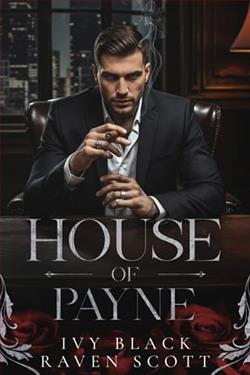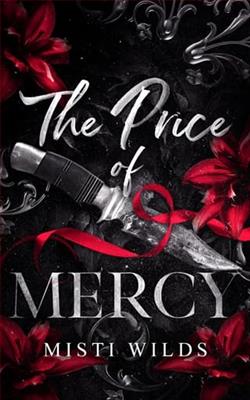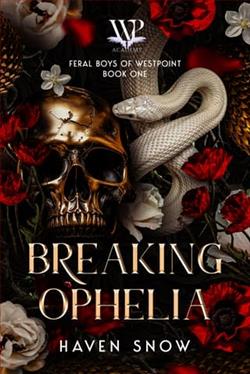Page 11 of Her Mountain Man Grump
I fucking love when she looks at me like that.
“What about you?” I ask. “Got any siblings?”
“Sadly not.”
“How about your parents?” I lean toward her, unable to hide my curiosity. “Are they back in New Mexico?”
“Yes.” She seems to shiver slightly. “We…don’t keep in touch.”
I frown. “How about friends? You got friends there, at least?”
Her answer is automatic. “We’re not allowed friends.”
As soon as the words are out of her mouth, her eyes widen. She avoids my gaze, looking mortified, like she’s said too much.
We’re not allowed friends…
What the hell does that mean?
“A-anyway,” she says, her voice a little breathless, “how do you, uh, how do you like living out here?”
“Emma.” I reach across the table, gripping her hand tight, but she still won’t look at me.
“I—” Her voice falters.
“Tell me what’s going on.” I hook my thumb beneath her chin, forcing her to meet my gaze. Her eyes are glassy, her bottom lip trembling as she holds back tears.
“I shouldn’t have said that,” she whispers. “Oh, God, this is all such a mess.”
“It’s okay,” I tell her. “You can trust me. Just start from the beginning. Tell me everything.
With a shuddering breath, she nods.
7
EMMA
I knew this was coming.Ever since Tanner came over and mentioned the red truck, I knew it was only a matter of time before I opened up. I can’t hide my fear any longer, and if I’m going to tell anyone, then I want it to be Brody. He’s given me so many reasons to trust him, and as he squeezes my hand, his eyes fixed on mine, I feel a burst of courage.
I can do this.
“It’s hard to know where to start.” I take a deep breath, thinking back. “My childhood was never exactly normal. I always knew we were different from other families. My parents didn’t send me to school, never took me to the doctor. We didn’t have a TV or a phone. But it wasn’t a bad childhood. My parents were a little eccentric, maybe—but they were loving.” I try to hold in the tears, blinking them back. “We went for picnics a lot. My father taught me how to play soccer. Mom read to me. And I could play with other kids in the neighborhood, even if I wasn’t allowed in their homes.”
I take a moment to compose myself before continuing.
“My father was always paranoid about…well, everything. That’s why he never registered my birth—he said birth certificates were just another way for the government to trackus. Everything was a conspiracy to him, and my mom bought it. His word was gospel to her.”
Brody is watching me, but I keep my gaze averted. If I look at him, I know I’ll fall apart.
“By the time I was ten, his paranoia had taken over completely. I wasn’t allowed outside anymore—he didn’t want the other children ‘corrupting’ me. He said we had to leave, move somewhere else. Somewhere people understood us. That’s when we moved to Scourfield.”
A lump rises in my throat. “It was a tiny community when we got there—just a few families living out in the desert. But it was already strict. We had to throw away most of our clothes when we arrived. Women had to wear dresses at all times, below the knee, in plain colors. For men, it was plain pants and long-sleeved shirts. I was already used to not having much freedom, but at Scourfield, I had none at all. Every second of the day was planned out and regulated. Every meal. Every word. I was so scared of saying the wrong thing that I pretty much stopped speaking.”
Brody curses under his breath, his hand squeezing mine. His touch reassures me, and I squeeze back before I continue.
“I was put to work pretty much straight away. The women cooked, cleaned, washed, and sewed clothing. The men cultivated the land and grew food or built houses for new families. When we weren’t working, we had lessons with the community leader, Isaac Foster. It was like listening to Father’s rants, but magnified by a thousand. Isaac taught us that society was doomed, poisoned by tech and lies and women who didn’t know their place. Only our community could be trusted. Outsiders were dangerous; they would try to control us. Destroy us.” I wince at the memories. Those long afternoons, sweltering in the heat of the desert as Isaac preached fervently, teaching us to see danger everywhere.
“I won’t bore you with all his beliefs,” I say with a sigh, “but we believed him. We truly believed we were the only people who understood the world, and that everyone outside Scourfield was corrupted. My parents believed it just as passionately as Isaac. They worshipped him, especially my father. But then Isaac got sick. He lost weight, started coughing up blood. But doctors weren’t trusted in Scourfield. Isaac said all medicine was laced with behavioral agents and micro trackers, so he never went to the hospital. It was quick. He was dead inside a couple of months…and that’s when my father became our new leader.”















